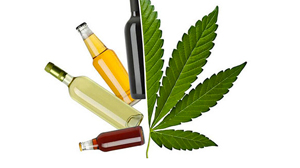Legalized Cannabis Could Curb Alcohol Consumption in Canada
3/17/2018 7:05 AM

Legalized Cannabis Could Curb Alcohol Consumption in Canada
Earlier this year, Wall Street research firm CFRA Research released a report indicating that the Canadian alcohol market should expect to see its sales numbers fall following the legalization of marijuana. The firm concluded that the legalization of marijuana will be a direct threat to alcohol consumption growth. In 2016, Canadian households spent an average of $1023 on alcohol products, up from $941 in 2013, and $890 in 2010. Analysts are now predicting these numbers to decline significantly due to “usage overlap”. In other words, because many of the same people who typically consume alcohol are also likely to consume cannabis.
The Canadian marijuana market has seen growth similar to that of the alcohol industry. According to StatsCan, since 1961, household spending on marijuana products has increased by an average of 6% per year. Moreover, cannabis has become cheaper, and more socially accepted by the older demographic that typically consumes more alcohol than cannabis. The average price per gram declined from $12 in 1989 to $7.50 in 2016. Additionally, 45 to 64 year olds accounted for only 4% of cannabis spending in 1975 but accounted for 23% last year.
Recent research from the US confirms that alcohol consumption falls in the face of increased marijuana availability. Researchers analyzed retail sales data for beer and wine in states that had legalized marijuana, and the counties that bordered them. They found sales fell by 9% immediately after legalization and had slumped as much as 13% two years later.
From a public health perspective, reducing Canada’s alcohol consumption is a very good thing. Alcoholic drinks can have negative effects on the brain, heart, liver, pancreas, and immune system. Alcohol interferes with the brain’s pathways and changes the way that it works, leading to mood disorders, decreased focus, and depressive symptoms. It can also seriously damage the heart by causing high blood pressure, arrhythmias, and strokes, among other things. Alcohol will also weaken the immune system, sometimes for up to 24 hours after drinking. Furthermore, alcohol abuse has been directly linked to cancers of the mouth, esophagus, throat, liver, and breast.
Because of our public health care system, the burden of treatment costs related to diseases and conditions resulting from alcohol abuse (both physical and psychological) is shared by all Canadian taxpayers. As alcohol consumption declines in the face of legalization, this money could be put to better use in our economy. Like, for instance, by investing in marijuana production. Canada imports most of its alcohol and tobacco products, sharing that revenue with other countries such as the US, Australia, and New Zealand. By comparison, almost all cannabis products are produced locally, thereby keeping revenues within local Canadian communities. So whether you want to help yourself, or help the economy, consider making the switch from alcohol to cannabis. Many already have, and many more will soon.







